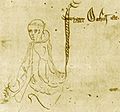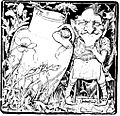Occam's razor facts for kids
Occam's razor is a smart idea from philosophy. Imagine there are two ways to explain something that happened. This principle says that the explanation needing the fewest guesses or assumptions is usually the correct one. In other words, the more assumptions you have to make, the less likely an explanation is to be true. Occam's razor is very useful in philosophy of science, but it can also help us think clearly in everyday life.
Contents
History of Occam's Razor
William of Ockham was a Franciscan friar, a type of monk, who studied logic in the 14th century. He helped make this principle famous. In Latin, it is sometimes called lex parsimoniae, which means "the law of briefness."
William of Ockham is often linked to the Latin phrase:
- Entia non sunt multiplicanda praeter necessitatem.
This roughly translates to:
- More things should not be used than are necessary.
This means if there are many possible ways something could have happened, the way that uses the fewest new ideas or guesses is probably the right one. However, Occam's razor only works when both the simple and complex explanations work equally well. If a more complex explanation does a much better job, then you should use that one.
Other Similar Ideas
One interesting point about Occam's razor is that it's not just about "things" (entia). It's more about explanations or hypotheses (educated guesses). Other smart thinkers have come up with similar ideas over time. For example, Ptolemy, an ancient astronomer, believed we should explain things using the simplest possible idea. Later, Isaac Newton also suggested that we should not use more causes for natural things than what is needed to explain them.
In science, Occam's razor is used as a heuristic. This is a general guiding rule or a helpful observation that helps scientists make choices.
Simple Examples
Let's look at some examples to understand Occam's razor better:
Fallen Trees Example
Imagine two trees have fallen down during a very windy night. Think about these two possible explanations:
- The wind has blown them down.
- Two meteorites each hit one tree. After hitting the trees, they crashed into each other and disappeared without a trace.
Both ideas are technically possible. But for the meteorite idea to be true, many unlikely things would also need to happen. For instance, the meteorites would have to hit each other and leave no marks. Also, meteorites are quite rare. Since this second explanation needs many assumptions to be true, it is probably wrong. Occam's razor tells us the wind blew the trees down. This is the simplest answer, and therefore, probably the correct one.
Feather Falling Example
Imagine someone drops a feather from a roof. If you wanted to calculate how long it takes to hit the ground, you might assume that air resistance doesn't matter. This makes the math easier. But this assumption probably won't give you a good prediction for how long the feather will actually take to fall. So, ignoring air resistance isn't the "simplest" idea in terms of what's really happening. The simplest idea here is to include air resistance, because it involves making fewer incorrect assumptions about the real world.
Medical Diagnosis Example
Occam's razor is also used in medicine. When doctors see many possible reasons for a patient's symptoms, they usually test the simplest diagnosis first. For example, if a child has a runny nose, it's most likely the common cold. It's much less likely to be a very rare birth defect. Doctors often say, "When you hear hoof beats, think horses, not zebras." This means to look for the most common and simple explanation first.
Related pages
Images for kids
-
A page from John Duns Scotus's book. It shows the words: "Plurality is not to be posited without necessity."
-
Sometimes, explanations can become too complicated. For example, adding leprechauns to an explanation might sound fun, but Occam's razor would say no, unless they were absolutely needed.
See also
 In Spanish: Navaja de Ockham para niños
In Spanish: Navaja de Ockham para niños
 | John T. Biggers |
 | Thomas Blackshear |
 | Mark Bradford |
 | Beverly Buchanan |




